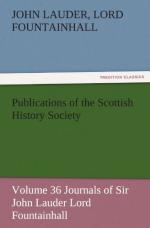natural. One was biography. They would
be surprised if they were to know how many biographies
there might be along the course of Scottish history,
say from the Reformation. If they fastened
on a single individual, and told the story of his
life, they not only told the story of his community
in a very interesting manner, but they got straight
to some of those faults which they were apt to be
impressed by if they gazed vaguely at the community.
Dr. Hume Brown had written an admirable summary of
the history of Scotland, but he had contributed
to the history of Scotland in another way by his
two biographies of Buchanan and Knox, and especially
by his biography of Buchanan. Another corrective
was literature. There had been no sufficient
perception of how literature might illustrate history;
and why should it not if their aim was to recover
the past mind of Scotland? Every song, every fiction—was
not that a transmitted piece of the very mind that
they wanted to investigate? Here was matter
already at their hand. Then, in a similar way,
if a noble thought, if a fine feeling, was in any way
expressed in verse or in prose, that came out of
some moment or moments in the mind of some individual,
and it must have corresponded and been in sympathy
with the community in which it was expressed.
Nothing noble had come out of any man at any one
time, but that man, in the way of expression of literature,
must have had a constituency of people who felt as
he felt. Unfortunately there was a long gap
in what we called the finer history of Scotland
from the time of the Reformation to Allan Ramsay—in
literature of certain kinds. There were muses
in those days, but they were muses of ecclesiastical
and political controversy—very grim muses,
but still they were muses. But from Allan Ramsay’s
time to this, to study the history of the literature
was to know more of the history of the country than
we would otherwise. David Hume, Adam Smith, Burns,
Scott—all these men were born and bred
in Scotland so poor and so squalid that we should
say we would not belong to it now. Nobody was
asking us to belong to it. But these men, their
roots were in a soil capable of sustaining their
genius and of pouring into their works those things
in the way of thought and feeling that delighted us
now, and that were our pride throughout the world.
Mr. D.W. KEMP seconded the adoption of the Report, which was agreed to.
The vacancies in the Council were filled
by the re-election of Dr. Hume
Brown and Mr. Balfour Paul, and the election
of Mr. John Scott, C.B., in
room of Mr. G.W. Prothero.
In reply to Mr. James Bruce, W.S., Dr. LAW said that the death of Dr. Mitchell had caused some delay in the preparation of the third volume of the Records of the General Assembly, but it had already been transcribed for the printer.
A vote of thanks to Professor Masson concluded the proceedings.




